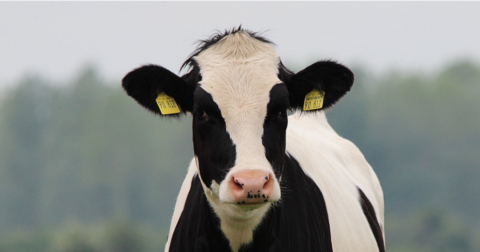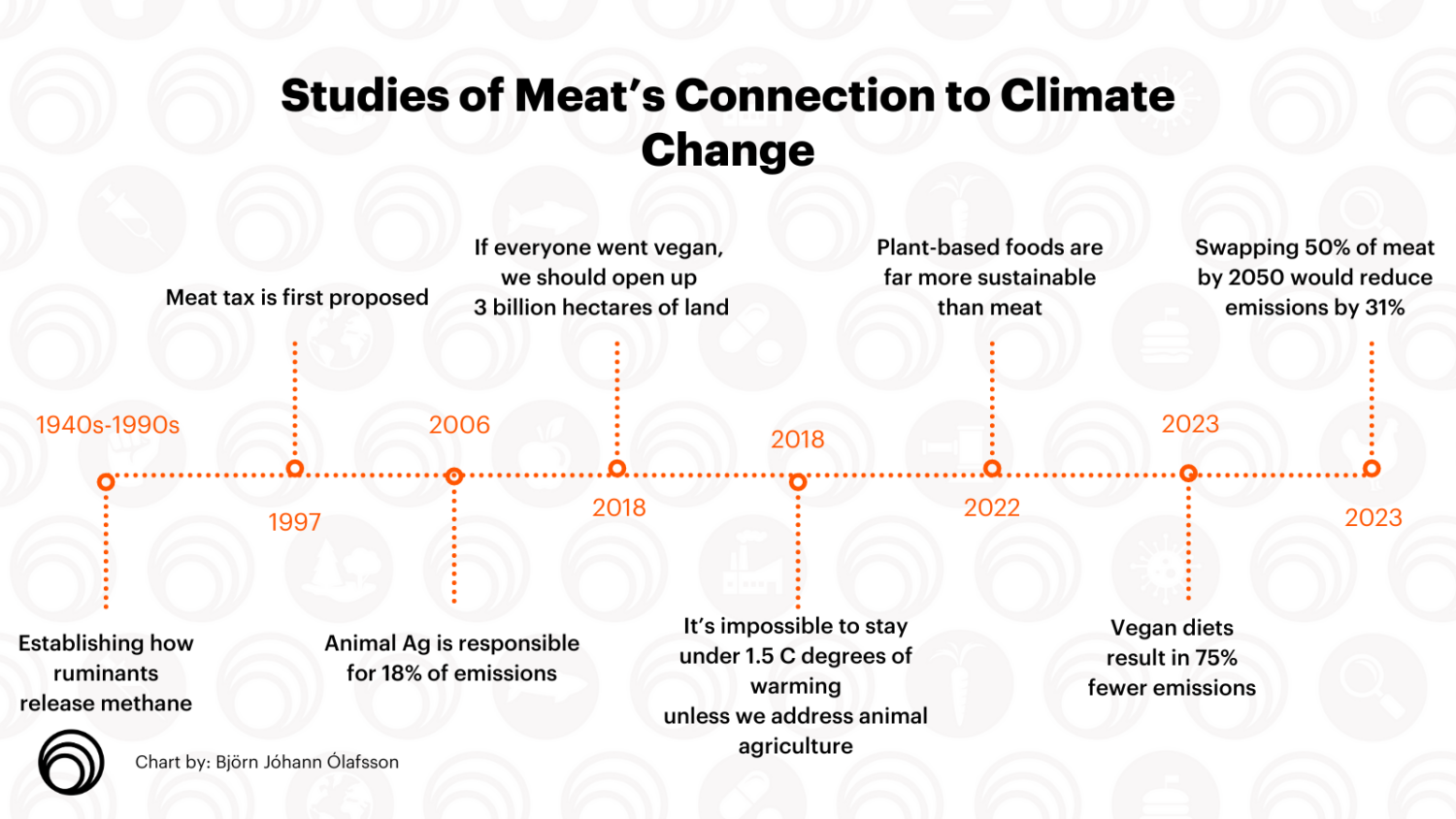Explainer
Why Eating Organic Isn’t a Climate Solution
Climate•8 min read
Analysis
As negotiations get underway at COP28, we compiled a list of the leading research documenting the connection between meat and greenhouse gas emissions.


Words by Björn Ólafsson
This weekend at COP28, the UN’s annual climate conference, the conference is hosting a first-ever Agriculture Day, touted as a “game-changer” by the United Arab Emirates conference host. Food system advocates are hoping this year’s conference will finally see some long-overdue progress in addressing the environmental damage of our food systems, especially emissions from factory farms. For decades now, scientists have been urging us, especially those of us in the global north, to eat less meat and dairy, both of which are responsible for massive environmental impacts and greenhouse gas emissions.
The meat industry has long worked to downplay the connection between meat and climate change and, at least so far, it’s working. 66 percent of Americans either don’t understand that eating meat is bad for climate change, or believe it has no impact at all. Media coverage isn’t helping. A study Sentient Media conducted earlier this year with Faunalytics found 93 percent of climate coverage did not mention the meat-climate connection.
But climate pollution from meat is well-documented, despite the industry’s best efforts to sow doubt. To illustrate just how much research there is, we’ve compiled a list of the leading studies.

The scientific evidence showing how meat harms the environment isn’t a recent addition. Our scientific understanding of biology and ecology has evolved over several decades in fact, especially greenhouse gas emissions tied to burps and manure, and the massive amount of land required to raise farm animals. Foundational studies from 1940, 1965 and 1979 are some of the earliest works documenting how ruminant animals’ produce methane. Pollution from waste figured in early studies too. In 1989, environmental scientists were testing how aquaculture harms marine life, while in 1990, researchers looked at water pollution linked to the dairy industry.
Biggest Takeaway: Ruminant animals release a lot of methane and use a lot of land.
In 1997, Canadian ecologist Robert Goodland published a paper on the impacts of passing a meat tax, especially for beef and pork, in rich countries. Over two and a half decades ago, Goodland argued that a tax on meat in wealthy countries would help reduce over-consumption — and its many environmental problems — without restricting populations in developing countries from eating a little more animal protein as it became more available.
Just 25 years later, Denmark, Sweden and Germany are now considering the meat tax as a potential climate solution.
Biggest Takeaway: Deploying a meat tax in rich countries would benefit the environment.
In 2006, the UN’s food and agriculture research term released a report that sparked a global conversation around animal agriculture’s climate impact. This United Nations report, released under the Food and Agriculture Organization (FAO), used a life cycle analysis to estimate what percent of global greenhouse gas emissions the animal agriculture industry is responsible for, initially published at 18 percent. This comprehensive report also calculated biodiversity loss, water pollution and air pollution.
After this report, the meat industry lept into action, both behind the scenes and in public. Big Meat launched a massive lobbying campaign to intimidate UN climate scientists into silence. In public, UC Davis scientist Frank Mitloehner attracted global media attention for his criticism of the UN’s calculations, though he would later admit his arguments did not fundamentally change the underlying findings of the UN’s report. The combined efforts appear to have worked — the organization eventually modified the estimated figures in 2013, landing at 14.5 percent. This was due to a differing measurement of responsibility, not flaws in the data, and has been criticized by some scientists as an undercount.
Biggest Takeaway: Animal agriculture is responsible for around 14.5 percent of global emissions, potentially more though maybe less.
In 2018, a team led by University of Oxford researcher Joseph Poore measured environmental impacts for over 40 different foods — including wheat, meat, cassava to cheese — and estimated each food item’s emissions, land use, acidification, water usage, and eutrophication. The paper used data from nearly 40,000 farms and 1,600 processors and retailers.
While the research did not specifically examine vegetables compared to meat, they noticed that “most strikingly, impacts of the lowest-impact animal products typically exceed those of vegetable substitutes,” and argued that this is in favor of meat-reduction diet change. The study took five years to complete. After only a year of reviewing data, the lead researcher Joseph Poore was so suitably convinced by the research that he went vegan himself.
That underlying research has since been used to create a wide range of reports and data journalism, including a report from the World Resources Institute and many of the graphics published about food systems at Our World In Data, and infographics from the BBC comparing the environmental impacts of a range of plant-based milks to dairy milk.
Biggest Takeaway: Veganism is the single biggest way to reduce our environmental impact; If everyone went vegan, we could free up 3 billion hectares of land.
GRAIN and the Institute for Agriculture and Trade Policy (IATP) teamed up to write this report, which tracked specific meat, dairy, oil, and gas companies’ emissions, starting in 2018 and estimating them up until 2050. By incorporating “indirect” emissions from farmed animals, such as land usage, they found that around 90 percent of meat companies are underreporting their emissions. They also found that if meat and dairy companies continue their “business as usual” growth, it will be nearly impossible to stay under 1.5 degrees Celsius of global warming.
Later that year, the World Resources Institute released a report about how to feed the world sustainably in the future, arguing that we need to reduce food waste and red meat consumption, among other interventions.
Together, these reports indicate that we must address diet if we are ever to stay under 1.5 (or 2) degrees of global warming.
Biggest takeaway: The world’s top five meat and dairy corporations are now responsible for more annual greenhouse gas emissions than Exxon, Shell or BP.
These researchers build on the 2018 food production study by modeling more than 40 raw foods, but 57,000 products, including processed foods. Again, all animal products, even minimally processed ones, were found to be the most environmentally destructive, far more so processed plant-based foods. Plant-based meats, for example, are not only more sustainable than meat, but also many processed desserts, cereals, and foods.
Biggest Takeaway: Plant-based foods are still more sustainable than the meat they replace.
This study, published in Nature and written by Oxford researchers, didn’t rely on modeling. Instead, they examined the actual diets of over 55,000 people in the UK and 38,000 farms across the globe.
Researchers found that vegans had one-fourth of the climate impact of high-meat-eaters, with far less land use, water use, eutrophication (excess water enrichment) and biodiversity loss. The data “should prompt the reduction” of animal products, the researchers concluded.
Biggest Takeaway: Vegan diets are responsible for 75 percent fewer greenhouse gas emissions.
In 2023, researchers asked what would happen if large sections of the population swapped out hamburgers for plant-based burgers? Well, the results would be practically utopian, and even better if we swapped out more. The study found that by replacing half of the meat we eat with plant-based alternatives by 2050, we could curb our food-related emissions by nearly a third, stop net deforestation entirely, lift 31 million humans out of hunger and significantly slow biodiversity loss. These accomplishments are all the more impressive when you consider that by 2050, the global human population will be more than 9 billion, according to UN estimates.
Biggest Takeaway: We can reverse biodiversity loss if we replace 90 percent of our meat and reduce greenhouse gas emissions by 31 percent if we swap 50 percent.
No, not even close. While these are some of the most-cited studies, the science around food-related emissions continues to evolve in supporting documents, smaller studies, collaborations and data analysis.
Some of the other studies isolate specific areas. A 2022 paper examined what would happen if everyone in NYC went vegan, and the city’s consumption-based emissions would fall by over half. Another paper in New Zealand found that sustainable, low-meat diets would greatly reduce the country’s environmental impact, but would cost a bit more money for rich households.
And the debate about exactly how much farmed animals contribute to global emissions continues to be debated – one paper says it has to be more than 16.5 percent while another says methane emissions are consistently undercounted and farmed animals contribute more than the UN models. Other scientists say that rewilding land currently used by farmed animals would offset 68 percent of emissions this century.
While these tiny percentage differences continue to be debated, a more important debate has emerged in academia: what to do about this? Meat taxes, investment into alternative proteins, incentivizing farmers to shift from animals to plants. . . lots of potential solutions, but all in need of public support.
While some studies disagree on the extent of the impact — all of the research shows that meat and dairy production is far more polluting to the planet than plant-based alternatives, and that diet change is a highly effective means of mitigating this damage.
One study, often cited as a criticism, argues that if everyone went vegan, only 2.6 percent of emissions would be eliminated. However, this study literally posits if everyone went vegan tomorrow, with no accompanying structural change — quite the extreme scenario. Rather than proving diet change isn’t effective, it suggests that diet change is best when introduced with structural reform or over time, making the case for a just transition in the food sector.
Many meat industry boosters and industry-funded papers have argued that a specific farm or region is, or could be, climate-neutral. A report published yesterday challenges these claims: the authors conclude that these studies “have a distorted understanding of the climate impact of livestock production” and don’t align with the Paris climate agreement. The culprit is data manipulation, employing greenhouse gas accounting alternatives to make emissions from meat seem lower than they actually are.
One alternative to the current factory farm system that’s often put forward is regenerative farming. But what does the evidence say about this type of farming method and its usefulness as a climate solution?
Regenerative agriculture has no single meaning, but the name has become an umbrella term for a number of farming methods billed as sustainable. The most popular of these strategies include cover crops, crop rotations and rotational grazing.
One meta-analysis from the Food Climate Research Network, which examined dozens of studies on all forms of grazing systems, found that regenerative farming’s offsets are either negligible, season-dependent, or reversible — and a world fed by grazing systems would be “problematic” and involve increased methane emissions.
On top of that, regenerative systems tend to require 2.5 times as much land, which also has a climate cost, as well as water. Studies suggest that a shift to more plant-rich diets would free up some of that for rewilding, returning land to a wild state, which is far more effective for offsetting carbon pollution.
Despite the massive investment in researching solutions like feeding cows seaweed additives, the technology tends to underdeliver on its promises. One study found seaweed feed could only reduce emissions by 28 percent and for a limited time only, usually while the animals are on feedlots only. However, media outlets have hailed red seaweed as a climate solution with 90 percent emissions reductions, despite its failure in the real world.
Cows, especially cattle raised for beef, spend sometimes as much as half of their lives grazing on pasture, even the ones that end up on intensive feedlots, so any reductions from additives only curb a short timespan.
Buying your meat from a local farm can only reduce a teeny-tiny amount of emissions by way of shorter transportation. Because most food-related emissions in the sector come from cattle burps and land use (either for pasture or feed crops), that little bit out of transportation (just 6 percent of the entire sector), is not much of a climate solution. Eating less meat is far less effective.
Swapping beef for chicken does result in some emissions savings, as beef and lamb are just so much worse. Still, filling your plate with lentils, tofu and alternative proteins is far lower, and is much better for animal welfare, health benefits (at least in the case of lentils, beans and tofu) and lowered zoonotic disease risk.
The overwhelming evidence has created an uncomfortable crossroads for many beef-loving environmentalists — can you still eat steak and campaign for climate action?
For an increasing number of climate activists and researchers, the answer appears to be no, or at least, not very much. Ultimately, dietary change doesn’t need to be all-or-nothing, which is why many climate organizations, including Project Drawdown, recommend a plant-rich diet rather than an entirely vegan one.
Still, many climate activists like Greta Thunberg and David Attenborough are increasingly turning down meat entirely. And we’re seeing institutional change too, with more universities offering plant-forward menus and climate conferences beefing up their selection of no-beef alternatives. It’s clear there has been some change, though there’s still plenty of challenges ahead for COP28 negotiators to tackle.